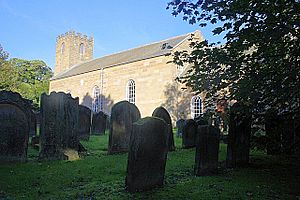Old All Saints Church, Skelton-in-Cleveland facts for kids
Quick facts for kids Old All Saints Church,Skelton-in-Cleveland |
|
|---|---|

Old All Saints Church and graveyard, Skelton-in-Cleveland
|
|
| Lua error in Module:Location_map at line 420: attempt to index field 'wikibase' (a nil value). | |
| OS grid reference | NZ 652 190 |
| Location | Skelton-in-Cleveland, North Yorkshire |
| Country | England |
| Denomination | Anglican |
| Website | Churches Conservation Trust |
| History | |
| Dedication | All Saints |
| Architecture | |
| Functional status | Redundant |
| Heritage designation | Grade II* |
| Designated | 25 May 1966 |
| Architectural type | Church |
| Completed | 1785 |
| Specifications | |
| Materials | Sandstone, Lakeland slate roofs |
Old All Saints Church is a very old church in Skelton-in-Cleveland, a town in North Yorkshire, England. It's an Anglican church, which means it belongs to the Church of England. This special building is no longer used for regular church services, but it is protected as a Grade II* listed building. This means it's a really important historical place! The Churches Conservation Trust takes care of it, making sure it stays safe for everyone to see.
Contents
History of Old All Saints Church
This church was rebuilt in 1785 by a person named John Hall-Stevenson. It stands near Skelton Castle. Before this church, there was an even older one on the same spot. The Fauconberg family built that first church way back in the 1300s.
When the new church was built, some parts of the very old church were kept. For example, part of the north wall of the chancel (the area around the altar) is from the original building. This old wall has special memorials inside for the Trotter family, who lived in the castle.
In 1859, a font (a basin for baptisms) made of Caen stone was given to the church. Later, in 1884, a brand new church, also called All Saints, opened in High Street. The old font and one of the bells were moved to this new church. The roofs of Old All Saints Church were fixed and given new slate tiles in 1911. Finally, on December 1, 1996, the Churches Conservation Trust officially took over the care of this historic old church.
Architecture of the Church Building
Old All Saints Church is built from sandstone. Its roofs are made of Lakeland slate, with stone ridges and copings (caps) on the gables (the triangular parts of the wall at the end of a pitched roof).
Outside Features of the Church
The church has a main area called the nave with three sections. It also has a north transept (a part that sticks out like an arm of a cross) and a small room called a vestry in the northwest. There's a chancel at one end and a tower at the west end.
The nave is about 18.7 meters long and 7.8 meters wide. The chancel is about 8.1 meters long and 5.6 meters wide. The transept is about 4.9 meters long and 2.9 meters wide. The inside of the tower is about 2.7 meters square.
The tower has three levels. On the bottom level, there's a round-headed doorway on the south side. The middle level has a west window with a pointed top. The top level has round-headed openings for the bells. The very top of the tower has a battlemented parapet, which looks like the top of a castle wall.
You'll find square windows on the north and west walls of the church. On the south wall, there's a sundial that used to tell the time using the sun. The transept has round-headed sash windows. At the east end of the church, there's a special Venetian window with three parts. The chancel also has a round-headed door for the priest and another round-headed window.
Inside Features of the Church
The inside walls of the church are covered in plaster. There's a panelled gallery at the west end, which is like a balcony. It's held up by four thin, fluted (grooved) wooden columns and has sloped seating.
You can also see a three-decker pulpit (where the preacher stands) with a tester (a canopy above it). There are also box pews, which are like small enclosed seating areas. The transept was used as a special family pew and even has its own fireplace!
On the north wall of the chancel, there are memorials from the 1600s and 1700s. The chancel walls and arch also have painted boards with the Ten Commandments and other Bible verses. Elsewhere in the church, you can find three stone coffins from the Middle Ages and a carved coffin lid.
More Information
- List of churches preserved by the Churches Conservation Trust in Northern England

